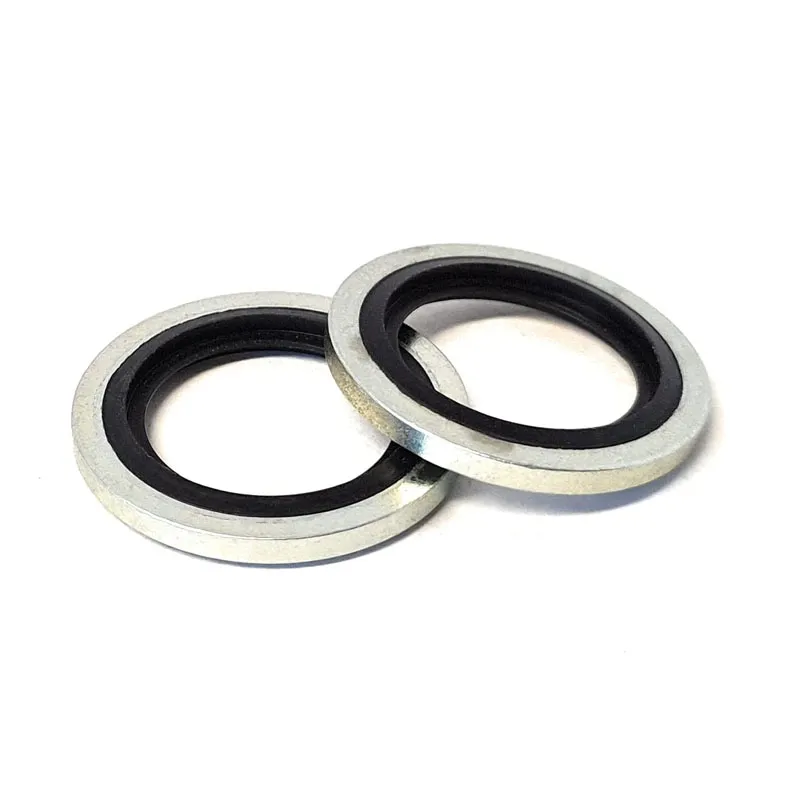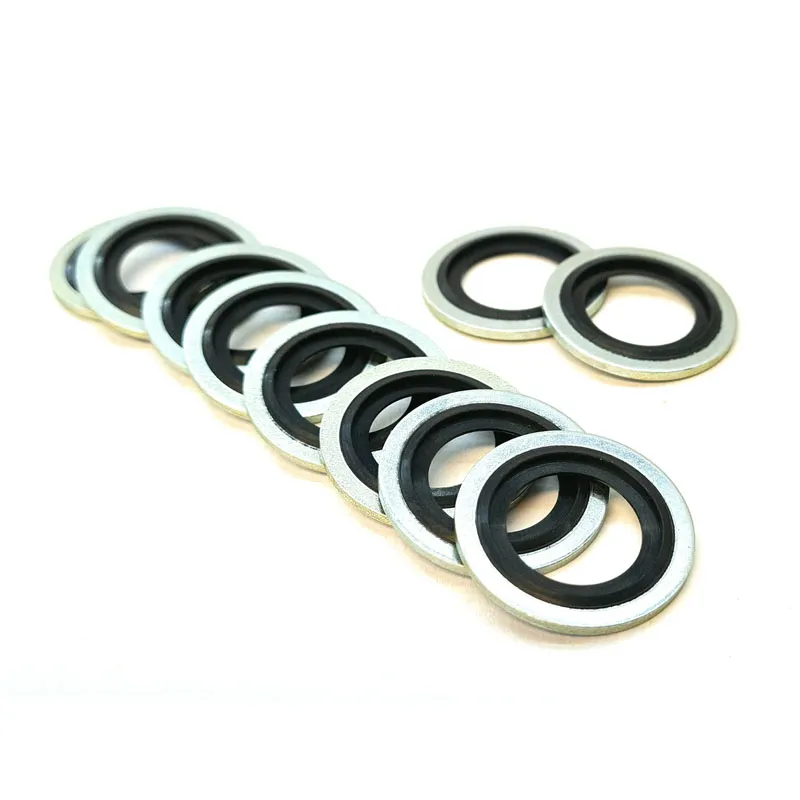Bonded Seals: Reliable Solutions for Fluid Sealing and Load Distribution
Bonded seals, often referred to as metal bonded seals, are essential components in mechanical systems that require a reliable and secure seal. These seals are designed to prevent fluid leaks, particularly around bolt holes, while also evenly distributing the load of the bolt or fastener. A key feature of the bonded seal is the molded elastomer lining, which enhances the sealing capability, making them ideal for high-pressure applications in industries such as automotive, hydraulics, and manufacturing.
 What is a Bonded Seal?
What is a Bonded Seal?
A bonded seal consists of a metal washer and an elastomer sealing element that is bonded to the inside diameter of the washer. The combination of the metal ring and the elastomer ensures both mechanical strength and excellent sealing performance. The metal washer handles the load distribution, while the elastomer forms a leak-proof seal around bolt holes or other fastening points.
Key Components:
- Metal Washer: Typically made from steel or stainless steel, the washer provides structural strength and load distribution.
- Elastomer Lining: Commonly made from rubber materials such as Nitrile (NBR), Viton, or EPDM, the elastomer prevents fluids from leaking through bolt holes by forming a tight, flexible seal.
The bonded seal offers several advantages over standard seals or washers, particularly in demanding applications where leaks are not acceptable.
Advantages:
- Prevents Leaks: The molded elastomer creates a tight seal that prevents fluids, gases, or oils from leaking through bolt holes, even in high-pressure environments.
- Load Distribution: The metal washer ensures that the load of the bolt or fastener is evenly distributed, reducing the risk of damage to the sealed joint.
- Durability: Bonded seals are designed to withstand extreme conditions, including high temperatures, pressures, and exposure to chemicals or oils.
- Easy Installation: Bonded seals are simple to install and can replace standard washers in many applications without modification.
Bonded Seal Kits: Comprehensive Sealing Solutions
A bonded seal kit typically includes a variety of bonded seals in different sizes to accommodate various bolt and fastening dimensions. These kits are especially useful in maintenance, repair, and overhaul (MRO) operations, as they ensure that the right size seal is always available when needed.
Applications:
- Hydraulic Systems: Bonded seals are commonly used in hydraulic systems to prevent fluid leaks at joints and fittings.
- Automotive: In automotive engines and transmissions, bonded seals prevent oil and fluid leaks in high-pressure areas.
- Manufacturing Equipment: Bonded seals are used to secure bolts in machinery that operates under high pressure or extreme conditions.
Benefits of a Bonded Seal Kit:
- Versatility: A comprehensive kit provides multiple sizes, making it easy to find the right seal for various applications.
- Convenience: Having multiple sizes on hand reduces downtime during repairs or installations.
- Cost-Effective: Buying seals in a kit is often more economical than purchasing individual seals.
 Bonded Piston Seals: Specialized Sealing for Hydraulic Cylinders
Bonded Piston Seals: Specialized Sealing for Hydraulic Cylinders
A bonded piston seal is a type of seal used specifically in hydraulic cylinders to prevent fluid leakage between the piston and the cylinder wall. These seals are crucial for maintaining pressure within the cylinder and ensuring smooth, efficient operation.
Features of Bonded Piston Seals:
- Dual Function: Bonded piston seals prevent both fluid leakage and provide load-bearing support, making them ideal for high-pressure hydraulic applications.
- Material Strength: The combination of metal and elastomer ensures that the seal can withstand high levels of pressure and temperature.
Applications:
- Hydraulic Cylinders: Used in construction, industrial machinery, and automotive hydraulics, bonded piston seals ensure smooth piston movement and prevent fluid leakage.
- Pneumatic Systems: These seals can also be used in pneumatic cylinders, where air pressure is used to power mechanical systems.
Bonded Seal Dimensions: Ensuring the Right Fit
Bonded seal dimensions are critical for ensuring a proper fit between the seal and the bolt or fastening point. The dimensions of a bonded seal typically include the inner diameter (ID), outer diameter (OD), and the thickness of both the metal washer and the elastomer. Selecting the correct size is essential for achieving a tight seal and preventing leaks.
How to Measure Bonded Seals:
- Inner Diameter (ID): This is the diameter of the hole in the center of the seal, which should match the size of the bolt or fastener.
- Outer Diameter (OD): The overall diameter of the seal, which should align with the area around the bolt hole where the seal is installed.
- Thickness: The thickness of the metal washer and elastomer should be considered to ensure that the seal fits securely and performs effectively under pressure.
Metal Bonded Seals: Strength and Reliability
Metal bonded seals combine the strength of a metal washer with the flexibility and sealing capabilities of an elastomer lining. These seals are ideal for high-pressure applications where both load distribution and fluid sealing are critical.
Applications of Metal Bonded Seals:
- High-Pressure Systems: Metal bonded seals are used in systems that operate under high pressure, such as hydraulic systems, fuel systems, and industrial machinery.
- Oil and Gas Industry: In oil and gas operations, metal bonded seals are essential for sealing flanged joints and preventing leaks in pipelines and equipment.
Advantages:
- Resistant to Wear: The metal component ensures that the seal is durable and resistant to wear, even in harsh conditions.
- Versatile: Metal bonded seals are available in a range of sizes and materials, making them suitable for a wide variety of applications.
Whether you’re using a bonded seal kit, installing a bonded piston seal, or selecting the correct bonded seal dimensions, these seals are essential for preventing leaks and distributing load evenly in high-pressure applications. Their combination of metal strength and elastomer flexibility makes them a reliable choice for industries ranging from automotive to hydraulic systems.
Contact us today to learn more about our range of bonded seals and how they can improve the performance and reliability of your systems!
-
Seal 12x20x5: Precision Radial Shaft Seals for Industrial Reliability
News Nov.24,2025
-
Seal 12x18x5: Essential Guide to Specifications, Applications & Vendors
News Nov.24,2025
-
Understanding Seal 12 20 5: Applications, Specifications & Industry Insights
News Nov.23,2025
-
Durable Oil Seal 85x110x12 – Reliable Sealing Solutions for Industry
News Nov.23,2025
-
Durable and Precise Oil Seal 75x95x10 for Efficient Machinery | YJM Seal
News Nov.22,2025
-
Durable Oil Seal 75x100x10 for Reliable Industrial Performance | YJM Seal
News Nov.22,2025
-
High-Quality Oil Seal 65x90x10 | Durable & Reliable Sealing Solutions
News Nov.22,2025
Products categories















